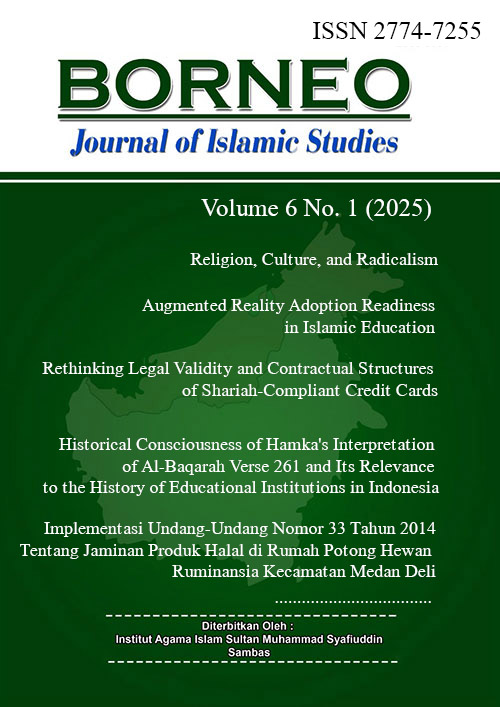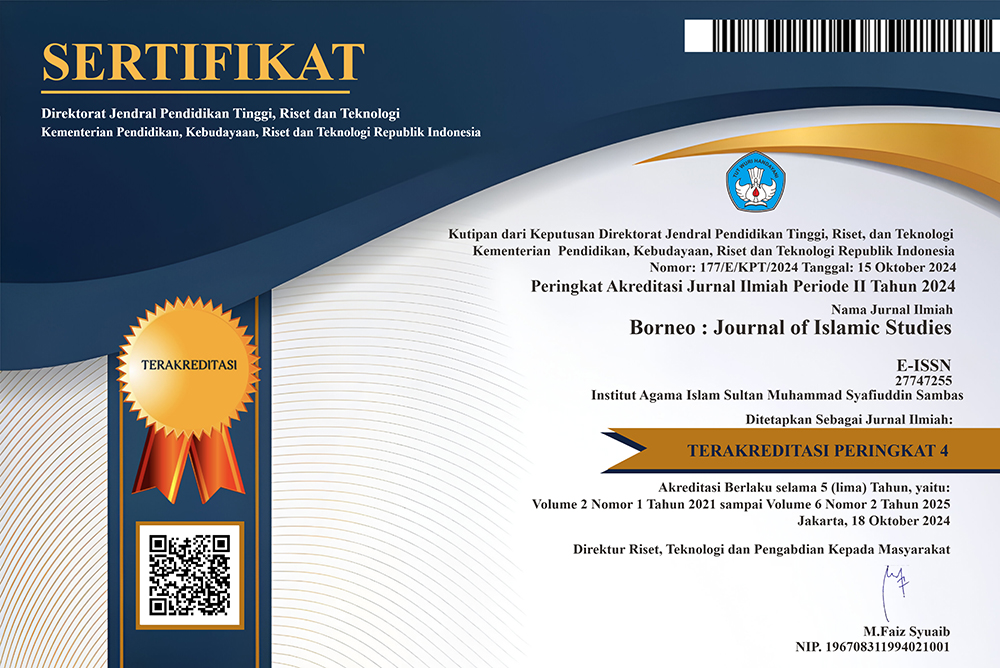Historical Consciousness of Hamka's Interpretation of Al-Baqarah Verse 261 and Its Relevance to the History of Educational Institutions in Indonesia
Abstract
Interpreter cannot help but be confined to a limited space and time in an effort to interpret the Qur'an. The interpreter is influenced by the externalization of his environment and the internalization of various knowledge. This research discusses the awareness of Hamka's historical influence in the interpretation of QS. al-Baqarah verse 261 and its relevance to the history of educational institutions in Indonesia. This research focuses on three things, namely the treasures of the interpretation of QS. al-Baqarah verse 261, Hamka's concept of education, and the history of national educational institutions that show Hamka's historical influence in the interpretation of the verse. This research uses the theory of “effective-historical consciousness” from Hans-George Gadamer. The conclusion of this research is, first, spending wealth in the way of Allah is not limited to jihad and hajj, but also all virtuous deeds. Second, Hamka has great attention to the field of education. Hamka's concept of education contains four important keywords, namely the function of reason, the integration of science and religion, the purpose of education, and gender equality. Third, before the existence of formal education in the form of schools, mosque, langgar and surau education were known. Then in the corridor of colonization of the archipelago, the Portuguese and Dutch colonizers established schools in the context of spreading religion and colonization. Meanwhile, during the Japanese colonization, the quantity of schools decreased. This limited number and quality faced by Hamka is one indication of the influence of history in Hamka's interpretation in Al-Azhar.
References
Abbas, I. (n.d.). Tafsir Ibnu Abbas. Gema Insani.
Al-Haq, H., & Amalih, I. (2021). KEADILAN SOSIAL DALAM AL-QUR’AN (TELA’AH ATAS PENAFSIRAN BUYA HAMKA DALAM TAFSIR AL-AZHÃR). El-Waroqoh : Jurnal Ushuluddin Dan Filsafat, 5(2). https://doi.org/10.28944/el-waroqoh.v5i2.315
al-Maraghi, A. M. (1993). Tafsir Al-Maraghi Jil. 3. Toha Putra.
Alfian, M. (2019). Pemikiran Pendidikan Islam Buya HAMKA. Islamika : Jurnal Ilmu-Ilmu Keislaman, 19(02), 89–98. https://doi.org/10.32939/islamika.v19i02.454
Asy-Syaukani, I. (2013). Tafsir Fathul Qadir Jil. 2. Pustaka Azzam.
ath-Thabari, M. bin J. (2007). Tafsir Ath-Thabari Jil. 4. Pustaka Azzam.
az-Zuhaili, W. (2013). Tafsir Al-Munir Jil. 2. Gema Insani.
Bariun, F. (1998). Malik Bennabi: Sosiolog Muslim Masa Kini. Pustaka.
Fatih, M. (2019). Konsep Ulama dalam Pandangan Mufassir Indonesia: Studi Aspek-aspek Keindonesiaan dan Metodologi Tafsir al-Azhar Karya Hamka dan Penafsirannya terhadap Term “Ulama” dalam al-Qur’an. Progressa, 3(2), 77.
Hamka. (1982). Tafsir Al-Azhar Jil. I. Pustaka Nasional PTE LTD Singapura.
Hamka. (2015a). Dari Hati ke Hati. Gema Insani.
Hamka. (2015b). Falsafah Hidup. Republika.
Hamka. (2015c). Tafsir Al-Azhar Jil. I. Gema Insani.
Hamka. (2016a). 1001 Soal Kehidupan. Gema Insani.
Hamka. (2016b). Angkatan Baru. Gema Insani.
Hamka. (2016c). Kesepaduan Iman dan Amal Saleh. Gema Insani.
Hamka. (2017). Falsafah Ketuhanan. Gema Insani.
Hamka. (2018). Islam, Revolusi dan Ideologi. Gema Insani.
Hamka. (2020). Dari Lembah Cita-Cita. Gema Insani.
Hamka, R. (2016d). Pribadi dan Martabat Buya Hamka. Noura.
Hanif, M. (2017). Hermeneutika Hans-Georg Gadamer dan Signifikansinya Terhadap Penafsiran Al-Qur’an. Maghza, 2(1), 107.
Hidayat, dkk., R. (2017). Dinamika Perkembangan Kurikulum di Indonesia. Labsos UNJ.
Isnaeni, H. F. (2018). Hamka: Ulama Serba Bisa dalam Sejarah Indonesia. Kompas.
Juono, R. P. (2017). KESETARAAN GENDER DALAM PENDIDIKAN ISLAM (Studi Pemikiran Pendidikan Hamka dalam Tafsir al-Azhar). Analisis: Jurnal Studi Keislaman, 15(1), 121–141. https://doi.org/10.24042/ajsk.v15i1.723
Kamal, T. C., & Mulyana, A. (2019). Peranan Buya Hamka Dalam Gerakan Pembaharuan Muhammadiyah Tahun 1925-1966. FACTUM: Jurnal Sejarah Dan Pendidikan Sejarah, 8(2), 213–224. https://doi.org/10.17509/factum.v8i2.22152
Katsir, I. (2004). Tafsir Ibnu Katsir Jil. I. Pustaka Imam Syafi’i.
Makmur, dkk., D. (1993). Sejarah Pendidikan di Indonesia Zaman Penjajahan. Manggala Bhakti.
Mas’ud, I. (2009). Tafsir Ibnu Mas’ud. Pustaka Azzam.
Musyarif. (2019). Buya Hamka (Suatu Analisis Sosial Terhadap KitabTafsir Al-Azhar). AL MA’ARIEF : Jurnal Pendidikan Sosial Dan Budaya, 1(1), 36–57. https://doi.org/10.35905/almaarief.v1i1.781
Puadi, H. (2019). Pemikiran Hamka tentang Konsep Pendidikan Islam. Pusaka, 6(2). https://doi.org/https://doi.org/10.35897/ps.v6i2.188
Quthb, S. (2000). Tafsir Fi Zhilalil Qur’an: Di Bawah Naungan Al-Qur’an (Surah Al-Fatihah-Al-Baqarah). Gema Insani.
Rozi, S., Nurlizam, & Zubir, M. (2024). The Reception of Hamka’s Tafsir Al-Azhar within Social Religious Issues in the Malay World. Jurnal Studi Ilmu-Ilmu Al-Qur’an Dan Hadis, 25(2), 247–272. https://doi.org/10.14421/qh.v25i2.5406
Rusli, R. (2014). Agama dan Manusia dalam Pendidikan Hamka (Studi Falsafat Agama). Intizar, 20(2).
Saeed, A. (2016). Al-Qur’an Abad 21: Tafsir Kontekstual. Mizan.
Shomad, B. A., Mujahidin, A., & Rofiq, A. C. (2024). Implications of Hamka’s thoughts in tafsir al-Azhar on the standpoint of Islamic social organizations in preventing authoritarianism in Indonesia. Indonesian Journal of Islam and Muslim Societies, 14(1), 91–116. https://doi.org/10.18326/ijims.v14i1.91-116
Sugiyono, dkk. (2018). Peta Jalan Pendidikan Indonesia. UNY Press.
Syaharuddin dan Heru Susanto. (2019). Sejarah Pendidikan di Indonesia: Era Pra-Kolonialisme Nusantara sampai Reformasi. FKIP Universitas Lambung Mangkurat.
Copyright (c) 2025 Al-Faiz Muhammad Rabbany Tarman, Ridwan Maulana Safii, Yusuf Rohmat Yanuri

This work is licensed under a Creative Commons Attribution-ShareAlike 4.0 International License.








.png)



